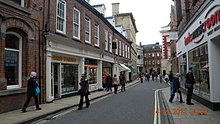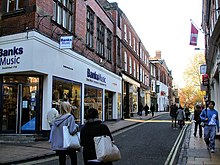Lendal

Lendal is a street in the city centre of York, in England.
History
The street was first mentioned in the 1380s, when it was known as Aldeconyngstrete (Old Coney Street). However, by 1641, it had become known as "Lendal", a contraction of "St Leonard's Hill". This "hill" was the quay on the River Ouse belonging to St Leonard's Hospital, which lay at the north-western end of the street.[1]
Most of the south-western side of the street was occupied by the Augustinian Friary, which was dissolved in 1538. St Wilfrid's Church lay on the north-east side until it was demolished later in the 16th-century. In about 1710, the city's main post office was built on the south-west side, while the large Judges' Lodgings house was built on the north-east side by Clifton Wintringham about 1720.[1]
For 24 years, a statue of Napoleon outside a tobacconist's shop on Lendal was a local landmark.[2] York Post Office remained on the street until 2019, when it moved to Coney Street.[3] Banks, located on Lendal, is the oldest music shop in Britain, having been founded in 1756.[4]
Layout and architecture

The street runs north-west from St Helen's Square to Museum Street. South of St Helen's Square, it continues as Coney Street. Museum Street was formerly known as Back Lendal, and both Lendal Tower on the York city walls, and Lendal Bridge lie on Museum Street, near where Lendal meets it.[1]
Judges' Lodgings lies on the north-east side of the street, while other listed buildings include the 19th-century Lendal House, and the terrace 13-23 Lendal, built in 1766. On the south-west side, 2 Lendal was built as a Congregational Chapel, built in 1816 by Pritchett and Watson. 8 Lendal was built in the 17th-century as Lendal House, although it was refronted in the 19th-century. 4A and 4B, behind it, are its former boat house and stable, and are incorporate a surviving part of the friary wall. The terrace at 10, 12 and 14 Lendal was built in 1714, while the former post office, and Lendal Cellars, down an alleyway, are all listed.[1][5]
References
- ^ a b c d An Inventory of the Historical Monuments in City of York, Volume 5, Central. London: HMSO. 1981. Retrieved 7 August 2020.
- ^ "Statue of Napoleon". History of York. Retrieved 14 August 2020.
- ^ Willers, Daniel (13 February 2019). "Post Office confirms branch in Lendal, York, will close after 135 years". The Press. Retrieved 14 August 2020.
- ^ "Banks music store in Lendal gets £200k revamp". The Press. 13 December 2010. Retrieved 14 August 2020.
- ^ Pevsner, Niklaus (1995). Yorkshire: York and the East Riding. Yale University Press. p. 222. ISBN 0300095937.
